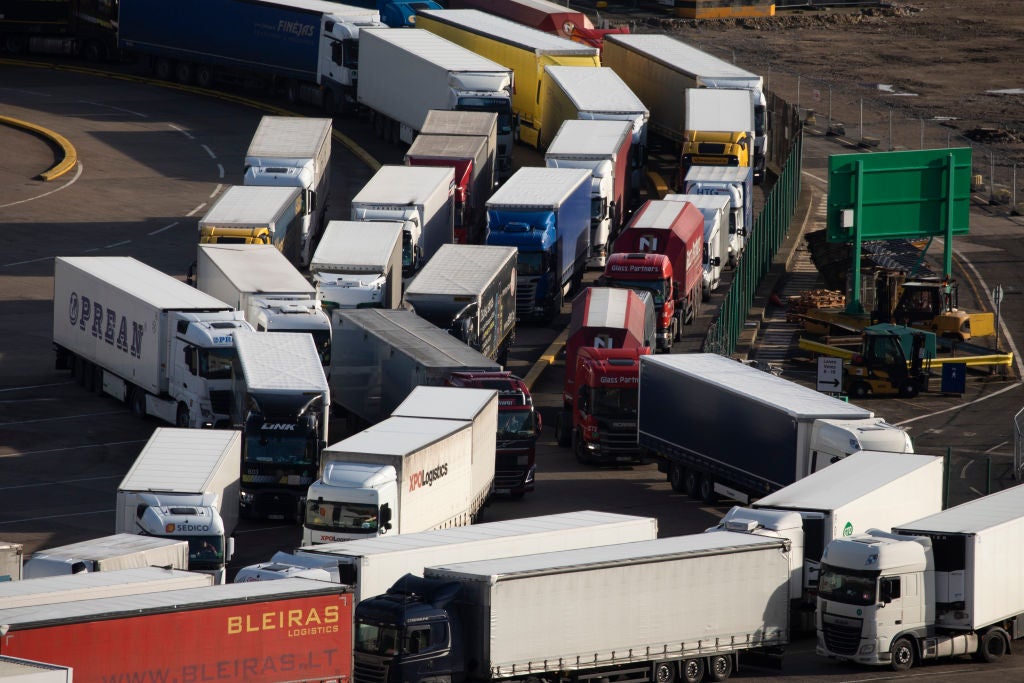Disruption to trade has been greater than Leavers expected – we must now hope common sense prevails
The complexity of the paperwork seems to have surprised even the large businesses that you would have thought had plenty of resources to cope, writes Hamish McRae


They are called non-tariff barriers and we are seeing them built up between the UK and the EU. Technically, there is free trade without tariffs but, in practice, physical trade is being impeded and trade in services (not covered by the agreement) is being blocked by excessive bureaucracy.
Thus there have been the hold-ups at Calais and Dover, Scottish fish unable to be exported to Europe, the famous sandwich incident when Dutch customs officials confiscated a Polish driver’s lunch, and problems of deliveries to Northern Ireland.
There have also been financial blockages, less obvious but equally disruptive. Some trading has gone from London to European capitals, but it seems quite a lot of business has gone to New York, because the EU recognises US regulations as “equivalent” to its own, whereas it has not yet agreed that with London.
There is a further twist to all this. UK firms are having to set up European offices to make exports easier, Scottish fishing vessels are choosing to unload their fish in continental ports, and EU financial firms are applying for UK licences to carry on their business here.
Stand back and what does all this mean? There are, unsurprisingly two very different reactions. Remainers argue that this shows how misguided (and misled) Leavers were in expecting to keep the benefits of membership after leaving the EU. Leavers think it shows how Europe wants to do Britain down by creating silly bureaucratic hurdles; that these are not our friends and we are best shot of them.
Both, in a way, are right. There will be a different relationship and this will take a while to settle down. Meanwhile, I am afraid there will be unpleasantness. But the practice of using non-tariff barriers to restrict imports and favour your own producers is long established. France in particular has a history of this. The most famous one goes back to the early 1980s when France wanted to stop Japan flooding the market with video recorders. When import duties failed to dampen demand it required all of them to be examined in a customs depot in Poitiers, staffed by just two officers who checked the serial numbers on every recorder. Unsurprisingly imports piled up – but France never did succeed in its aim of creating a state-owned competitor making VCRs, and eventually the barriers were lifted.
The moral of the story is that trade barriers may work for a while but in the long run they are not very successful. But that won’t stop countries trying. Japan notoriously barred US beef on the grounds that Japanese had different intestines from Americans, and foreign skis (including French ones) by claiming that their snow conditions were different. China, despite being a member of the World Trade Organisation since 2001, uses trade barriers not only to deter foreign competition but also to punish countries that criticise its human rights record – witness its current dispute with Australia.
So what lessons can we draw about Britain’s long-term trading relationship with Europe from the first three weeks’ experience of Brexit?
I think the first is that the disruption is greater than the Leavers expected. It is difficult to separate the Covid-induced chaos from the Brexit-driven mess. But the complexity of the paperwork does seem to have surprised even the large businesses that you would have thought had plenty of resources to cope. You can do a lot of damage to trade with spurious health and safety regulations. I remember years ago having a French free-range chicken confiscated when we came off the ferry in the UK, though the customs officer did have the grace to apologise and admit it was probably healthier than the British battery ones.
Second, even though this will settle down, UK trade will shift away from Europe. It was already shifting. Now the move to other markets and other suppliers will happen faster. Some exporters will suffer, but domestic producers will benefit, simply because higher UK costs will be offset by shorter and simpler supply chains. Costs overall will rise, but in the broader scheme of things I don’t think trade friction will be a huge contribution to that. There are other reasons for expecting a rise in inflation, including the pent-up demand that will follow once the lockdowns are eased.
Third, it is not in the self-interest of either side to discourage trade. If people want to buy and sell stuff from and to each other, they should be allowed to do so. I suspect that, as the months go by, the practical advantages of cross-border trade will become more evident and that self-interest will trump protectionist instincts. I hope so because if I am wrong, having sandwiches confiscated by the customs will be the least of our problems.




Join our commenting forum
Join thought-provoking conversations, follow other Independent readers and see their replies
Comments